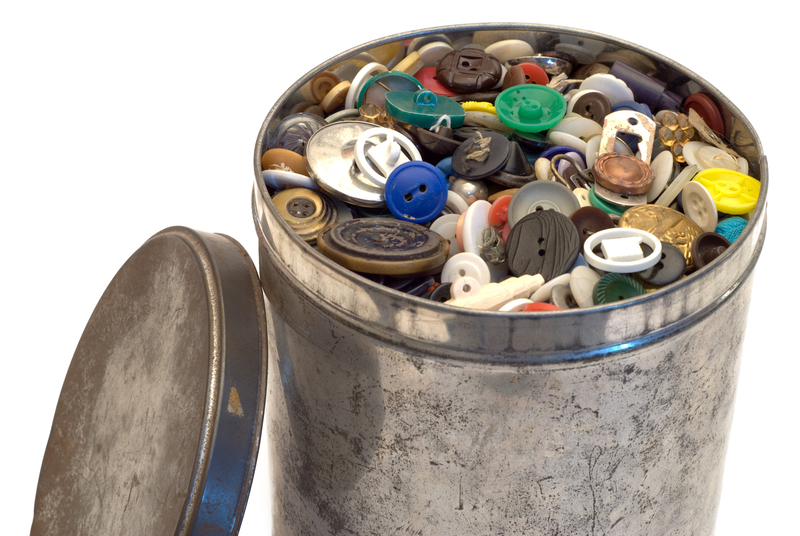Find Nearby Scrap Yards for Pots and Pans Recycling
Are you looking to responsibly dispose of old pots and pans cluttering your kitchen? Perhaps you want to turn that unused cookware into something good for the environment and even earn a little cash. Recycling cookware is a sustainable solution, and the best place to start is to find nearby scrap yards for pots and pans recycling. In this comprehensive, SEO-optimized guide, we'll cover everything you need to know about recycling cookware, how to locate a suitable scrap yard, and why this practice is important for you and the planet.
Why Recycle Pots and Pans?
Pots and pans recycling is about more than just clearing up cabinet space. Here are several compelling reasons you should consider recycling your old cookware:
- Sustainability: Cookware is typically made from metals like stainless steel, aluminum, and copper--all of which are highly recyclable.
- Resource Conservation: Recycling these metals saves significant amounts of energy compared to mining and processing raw materials.
- Waste Reduction: Old pots and pans do not decompose in landfills, contributing to environmental pollution.
- Possible Earnings: Scrap yards often pay by weight for metal cookware, turning your clutter into cash.
If your kitchen supplies are battered, burnt, or beyond repair, recycling is the most responsible option.

Which Types of Pots and Pans Can Be Recycled?
Most types of cookware can be recycled, but some conditions apply. It's vital to know what your local scrap yard accepts. Here's a quick overview:
- Stainless steel pots and pans - Highly recyclable, commonly accepted at most scrap yards.
- Aluminum cookware - Lightweight and easily recycled, although non-stick coatings may need to be removed for best results.
- Copper cookware - Highly valued, though make sure to remove non-metal parts.
- Cast iron pans - Very heavy, 100% recyclable, but may be harder to handle.
Nonstick pots and pans with Teflon coatings can sometimes be a challenge. Some centers may refuse these unless you can remove the nonstick surface. Glass lids, plastic handles, and other non-metal components usually must be separated before recycling. Always check your local options for specific requirements.
How to Prepare Your Cookware for Recycling
Before you head to your nearest scrap metal recycler or cookware recycling center, a little preparation ensures your items are ready for processing. Here's what you should do:
- Remove non-metal parts: Unscrew and dispose of plastic or wooden handles, glass lids, and rubber grips.
- Clean the cookware: Remove food residue, grease, and rust. While not always necessary, scrap yards appreciate clean metal.
- Sort by material: Separate aluminum from stainless steel and other metals to make processing easier for the recycler.
Proper preparation makes it easier for scrap yards to process your items, and you may even get a higher payout for well-sorted materials.
How to Find Nearby Scrap Yards for Pots and Pans Recycling
Now that you know the value of recycling old cookware, the next step is to locate a suitable facility. Finding a scrap yard near you that accepts pots and pans is easier than you may think. Follow these steps to ensure you find the best local service:
1. Use Online Scrap Yard Locators
- Earth911 (earth911.com): Offers a comprehensive recycling search tool for all types of household items.
- ScrapMonster (scrapmonster.com): Provides listings of scrap yards by location and material type.
- RecyclingCenters.org: Search by city or ZIP code for various recycling facilities.
- Google Maps or Apple Maps: Simply search "scrap yards near me" or "metal recycling near me."
2. Contact Local Scrap Metal Dealers Directly
Not all scrap yards process cookware. When you call, specifically ask if they accept "pots and pans recycling" or "kitchen cookware recycling." Some locations may have restrictions on nonstick or coated items.
3. Check with Municipal Recycling Facilities
Your city or county recycling program might offer collection or drop-off points for metal kitchen items. Visit their website or call your public works department to ask specifically about recycling pots, pans, and other kitchenware. Many programs now offer household metal recycling events.
4. Explore Retailer and Manufacturer Take-Back Programs
- Pots and Pans Brands: Some manufacturers, such as Calphalon, offer their own cookware recycling programs.
- Retailers: Certain stores (for example, Bed Bath & Beyond, Sur La Table) may have cookware trade-in or recycling events.
5. Community Recycling Events
Keep an eye out for local e-waste or hazardous waste collection events. While these are primarily for electronics, some include metal goods recycling, including old cookware. Local community boards or city websites typically have event calendars.
Tips for Getting the Most Out of Your Pots and Pans Recycling Trip
- Weigh your items: Scrap yards pay by the pound. For heavier items like cast iron or copper pots, you could earn more.
- Bundle similar metals: Mixing metals might lower your payout rate. Group stainless steel, copper, and aluminum separately.
- Bring ID: Many scrap yards require identification to complete your transaction due to local laws.
- Ask about pick-up: If you have a large amount of cookware or accumulated metal, some scrap yards offer pick-up service.
The Environmental Impact of Cookware Recycling
When you recycle pots and pans at a nearby scrap yard, you're making a significant positive impact. Did you know:
- Recycling aluminum saves up to 95% of the energy required to make the same amount of aluminum from raw materials.
- Steel can be recycled infinitely without losing quality.
- Recycling copper reduces mining waste and the devastating environmental impacts of copper extraction.
Each time you recycle your old cookware rather than throwing it away, you contribute to conservation efforts, reduce landfill waste, and help curb the demand for new raw materials.
Alternative Ways to Recycle or Repurpose Old Pots and Pans
Before you drop your cookware at the nearest scrap yard, consider whether it could serve another purpose:
Give Away or Donate
If your pots and pans are still usable (even if they're cosmetically scratched or worn), consider donation to:
- Local shelters or soup kitchens
- Charity thrift stores
- Habitat for Humanity ReStores
Repurpose for Home & Garden
- Planters or garden containers: Punch holes in the bottoms and use as quirky flower pots.
- Storage bins: Use large pots to organize tools, toys, or craft supplies.
- Home decor: Upcycle into rustic wall art, mobiles, or even lampshades.
Upcycle as Art Projects
- Turn lids into clocks or mirrors.
- Transform pans into bird baths or feeders.
- Paint and decorate for use as creative gift baskets.
These creative uses can extend the life of your kitchenware and reduce waste even further.

FAQs: Pots and Pans Recycling Near Me
Can I put pots and pans in curbside recycling?
Most curbside recycling programs do not accept pots and pans. These items can damage sorting machines or may not match the processing requirements. It's best to deliver them directly to a scrap metal recycling center or a local scrap yard.
Do scrap yards pay for old cookware?
Yes, most metal recycling yards pay for old cookware according to the type and weight of the metal. Copper and stainless steel typically fetch higher prices than aluminum.
How can I tell what metal my pots and pans are made of?
Look for manufacturer stamps or labels on the bottom. Stainless steel is heavier and not magnetic; aluminum is very light and usually has a dull finish. Cast iron is heavy and dark. Use a magnet--if it sticks, it's likely steel or iron; if it doesn't, it may be aluminum or copper.
Do I need to remove the handles and screws?
It's best to remove all non-metal parts before delivery. Scrap yards may require this for better processing and may refuse items with too many mixed materials.
Conclusion: Do Your Part--Recycle Your Cookware Responsibly
Recycling old pots and pans is a practical, environmentally-friendly way to declutter your kitchen while conserving valuable resources. Whether you are discarding an ancient skillet or a broken saucepan, finding a nearby scrap yard for pots and pans recycling is the most sustainable choice.
Always remember:
- Sort and clean your cookware first.
- Confirm the yard's accepted materials before making a trip.
- Explore alternative uses or donation options for gently used items.
With a little effort, you can ensure your old cookware enjoys a second life as recycled metal, and you'll be doing your part to protect the environment. Start today--search for a pots and pans recycling center near you and contribute to a cleaner, greener future!
Still have questions? Let us know in the comments below or share your experiences recycling cookware in your community!